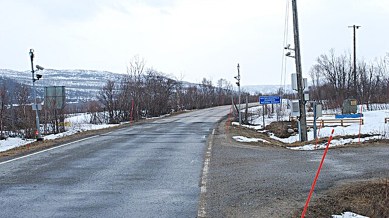Broken leg, no phone, no water: How US journalist survived six days in Norway’s wilds drinking own urine
A slip on a mountain ridge sent the 38-year-old climate journalist tumbling down a cliff, leaving him with a broken femur, no phone, no water, and stranded alone in the wilderness for six days.

Alec Luhn set out on what was meant to be a challenging but exhilarating four-day solo hike across Norway’s glacier-filled Folgefonna National Park. But what began as an adventure quickly turned into a harrowing survival story. A slip on a mountain ridge sent the 38-year-old climate journalist tumbling down a cliff, leaving him with a broken femur, no phone, no water, and stranded alone in the wilderness for six days.
“I remember thinking, ‘This is really bad. This is the start of the disaster movie,’” Luhn told CNN. “This is that moment where everything goes really, really wrong.”
monthly limit of free stories.
with an Express account.
Luhn, a climate journalist from Wisconsin, US had set out in late July for a four-day hike in southwest Norway’s Folgefonna National Park — a massive stretch of land noted for its glaciers.
Experienced and prepared for spotty cell service, Luhn had warned his wife that communications might be limited. But even he could not have anticipated how quickly things would unravel. On the first day, the sole of his left boot began to detach. “I didn’t want to go back in. It was just the very start of the hike,” he recalled. “That was the first bad decision I made.”
Later, as he reached the Buarbreen glacier, disaster struck. “I just remember sliding down the mountain at first, and then spinning down the mountain, rolling down the mountain, and then just pinballing down the mountain,” Luhn said. When he stopped, his femur had snapped. “My left foot was just flopping around with no direction,” he said.
With his backpack ripped open and belongings lost—including his phone and water—Luhn braced himself for days of isolation. His wife, expecting no contact until Monday, had no idea that he had already been critically injured.
The first days were a “trial by drought,” Luhn said. Food was impossible to swallow without water, and in desperation, he resorted to drinking his own urine. “The next time that I had to pee, I peed in my water pouch. I drank my urine, basically to have a little bit of hydration, and to also get a little bit of food down.”
Back in London, his wife began to panic when he failed to board his return flight and alerted Norwegian authorities. Bad weather hampered the initial search, but on August 6, nearly a week after his fall, a breakthrough came.
“I woke up in the morning. It’s very cold, very wet… and the helicopter came,” Luhn recalled. At first, it passed him by. Determined, he fashioned a flag with a tentpole and bandanna. “I was just waving and just crying out with all my might. And finally, the side door of the helicopter opens, and somebody waved back at me. That’s when I knew that it was up. It was all going to finally be over.”
Reunited in hospital with his wife, emotions spilled over. “I said, ‘I love you.’ And she said, she said, ‘I’m gonna rip you a new one, but for now, I love you.’”
Reflecting on the ordeal, Luhn said it reshaped his perspective on life and survival. “It was very lonely up on that mountain… I was just thinking about how I might die on this hike… and I would never see my wife or my parents or my brothers and sisters again. That was the most painful thing I could possibly think of,” he said.